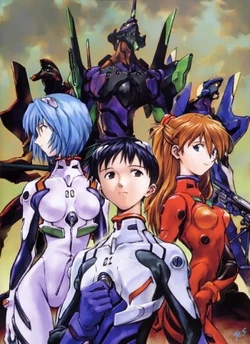Evangelion (エヴァンゲリオン, Evangerion) is franchise created by Hideaki Anno and Gainax and currently owned by Anno's Studio Khara. The franchise launched in 1995 with the Neon Genesis Evangelion. It won several major animation awards. The anime was created by Gainax, written and directed by Hideaki Anno, and co-produced by TV Tokyo and Nihon Ad Systems (NAS).
A number of manga series based on the anime have been released. Neon Genesis Evangelion, by series character designer Yoshiyuki Sadamoto, has been serialized since February 1995, eight months previous to the official premiere of the series. Two other manga based on non-canonical video games have been created: Neon Genesis Evangelion: Angelic Days, by Fumino Hayashi, Shinji Ikari Raising Project by Takahashi Osamu and Gakuen Datenroku by Min Min.
Many animated movies have followed, all of which provide alternative endings to the series, including Death and Rebirth, The End of Evangelion, and Revival of Evangelion. In 2006 Rebuild of Evangelion was announced, a series of four animated films providing an alternate retelling of the original anime series. So far, three of the films have been released.
Plot[]
As the first episode opens in the year 2015, Tokyo-3 is being attacked by the third Angel. Conventional weapons prove ineffective, largely due to its projected force field called an AT Field. Nerv takes command of the battles, and is able to intercept and defeat the Angels using the Evangelions (Evas), biomechanical mecha previously developed in secret by Gehirn inside the underground Geofront; the Geofront is located underneath Tokyo-3.
Not knowing why his father summoned him, Shinji Ikari, a 14-year-old boy arrives to Tokyo-3 just as the Third Angel attacks the city. Shinji reluctantly agrees to join Nerv to pilot Evangelion Unit 01, and begins living with Captain Misato Katsuragi. He and Rei Ayanami battle the successive advances of the Angels together and are later joined by Asuka Langley Soryu, the pilot of Unit 02.
Each Eva has its own designated pilot (Unit 00–Rei, Unit 01–Shinji, Unit 02–Asuka, and subsequently Unit 03–Toji Suzuhara), and operates by synchronizing the pilot's soul and the human soul inside the Eva via the enigmatic liquid substance known as LCL. (In the context of Evangelion, a "soul" refers to an individual's conscious existence, mental structure and identity, rather than a more conventional "supernatural" entity.) Surrounded by LCL, the pilot's nervous system, mind and body join with the Eva's controls, allowing the Eva to be controlled by the pilot's thoughts and actions. The higher a pilot's synchronization ratio, the better the pilot can control the Eva and fight more adeptly.
While Ritsuko mentions at the series' beginning that the Evas do have some biological components to them, the extent of this is not immediately apparent. Unit 01 is connected to Yui Ikari, Gendo's wife and Shinji's mother, since it absorbed her body and soul in a failed experiment, as shown in episodes 16 and 20. Rei herself is suspected to be a partial clone of Yui, and is known to harbor the soul of Lilith, the second Angel.
It is finally revealed, towards the end of the series, that the Evas are not really "robots" but are actually cloned Angels (Units 00, 02, 03, and 04 are made from Adam, and 01 is made from Lilith) onto which mechanical components are incorporated as a means of restraint and control. This control is not perfect, as various units are shown over the course of the series driving into "berserker" mode, in which they can act of their own will, independent of any artificial power input.
Along with the battles against the Angels, the central characters struggle to overcome their personal issues and personality conflicts, which factor heavily into the events of the series and its eventual conclusion. Throughout the series, many of the main characters constantly have to cope with several social and emotional problems: characters are unwillingly forced to confront socially complex and challenging situations; unresolved sexual tensions grow between numerous characters; injuries, deaths, and defeats cause blows to their psyches; and previously steady relationships begin to falter.
Over the final months of 2015, the characters begin to learn of the true plan of Nerv and Seele, the Human Instrumentality Project. Its purpose is to force the completion of human evolution, and thereby save it from destroying itself. To do so, they plan to break down the AT fields that separate individual humans, and in doing so, reducing all humans to LCL, which is revealed to be the "primordial soup", the fundamental composite of human beings. All LCL would then be united into a supreme being, the next stage of humanity, ending all conflict, loneliness and pain brought about by individual existence. At the end of the series, Seele and Nerv come into direct conflict over the implementation of Instrumentality.
In the last two episodes (the second set in 2016), Gendo and Rei initiate the Human Instrumentality Project, forcing several characters (especially Shinji) to face their doubts and fears and examine their self-worth, with sequences that "suggest animated schizophrenia" This ending was made up of flashbacks, sketchy artwork, and flashing text "over a montage of bleak visuals, that include black and white photos of desolate urban motifs such as a riderless bicycle or vacant park benches interspersed with graphic stills of the devastated Nerv headquarters in which Shinji's colleagues are seen as bloodstained bodies", and a brief interlude depicting an "alternate" Evangelion universe with the same characters but apparently in the high school comedy genre, eventually seems to depict Shinji concluding that life could be worth living and that he did not need to pilot an Eva to justify his existence; he is then surrounded by most of the cast, clapping and congratulating him. The introduction implies that this same process took place for everyone.
External Links[]
Official[]
Other Sources[]
Other Wikis[]
References[]


